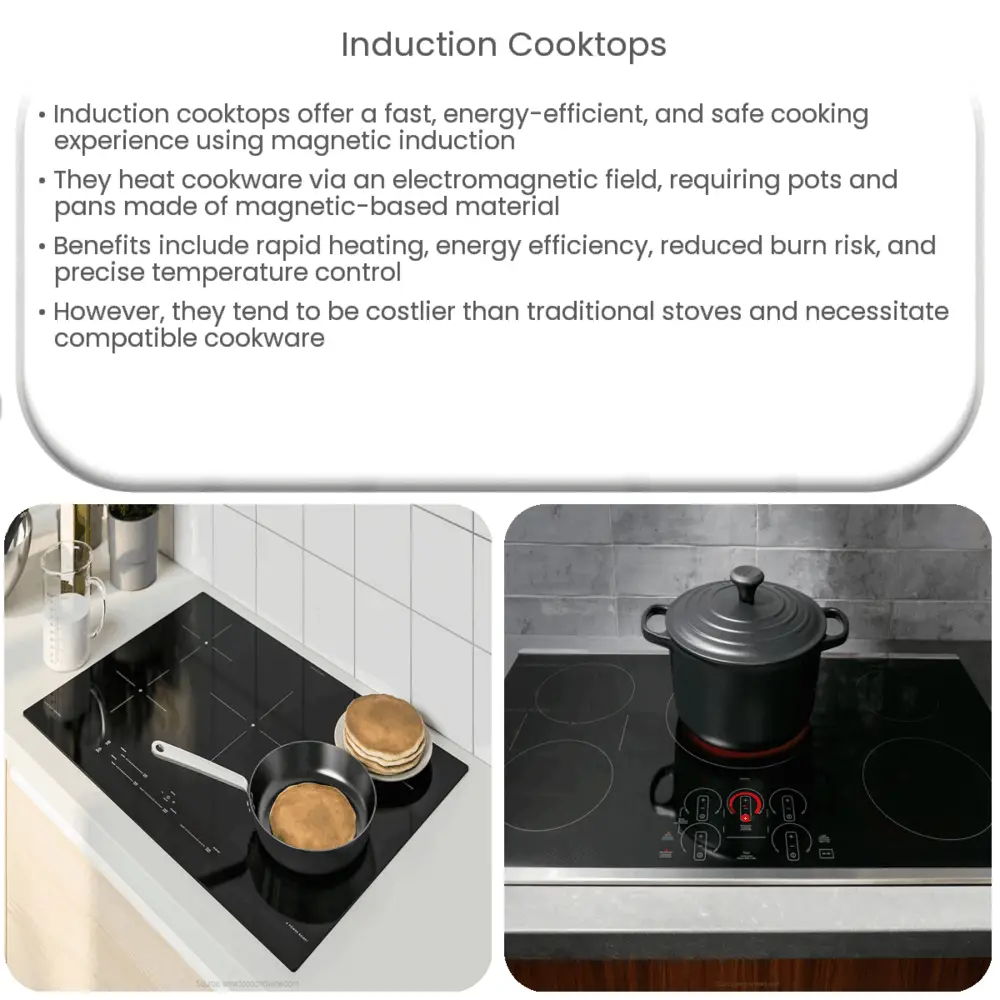Explore the world of induction cooktops: understand their working, benefits, suitable cookware, buying considerations, and more.

Understanding Induction Cooktops
Induction cooktops have revolutionized modern cooking with their unique technology and numerous advantages. Unlike traditional gas stoves or electric cookers, induction cooktops offer a seamless, highly efficient cooking experience that saves time, energy, and promotes safety.
How Induction Cooktops Work
At the core of induction cooktop technology is the principle of magnetic induction. Instead of using direct heat, like in gas or electric stoves, induction cooktops heat your cookware via an electromagnetic field. When you place a pan or pot on the cooktop, it becomes the source of heat, ensuring efficient heating and better cooking results.
- The induction cooktop features a copper coil beneath the glass surface.
- When you switch on the appliance, an alternating electric current is passed through this coil.
- This current generates a dynamic magnetic field.
- This magnetic field induces an electric current (hence the name induction) in the pot, which has to be made of or contain a ferrous metal.
- The resistance of the metal to this current generates heat, which in turn cooks the food inside the pot.
Benefits of Induction Cooktops
Induction cooktops come with several benefits that make them an increasingly popular choice among professional chefs and home cooks alike. Here are some of the key benefits:
- Speed: Induction cooktops heat up quickly, which means you can cook your meals faster. The heat is directly transferred to the pot, resulting in efficient cooking.
- Energy Efficiency: Induction cooktops are more energy-efficient compared to gas or electric stoves. They use less electricity and generate less heat waste.
- Safety: The surface of an induction cooktop doesn’t get hot unless it’s in contact with a ferrous metal, which reduces the risk of burns.
- Precise Control: Induction cooktops offer precise control over cooking temperatures, allowing for better cooking results.
Induction cooking certainly represents a leap forward in culinary technology. In the following section, we will explore further details about the types of cookware suitable for induction cooktops, as well as some considerations before purchasing one.
Choosing the Right Cookware for Induction Cooktops
Not all cookware works with induction cooktops, an important factor to keep in mind when considering this technology. Induction-compatible cookware must be made of a magnetic-based material, such as cast iron or some stainless steel. The easiest way to check if your pot or pan is compatible is by sticking a magnet to its base. If it sticks, it will work.
- Cast Iron: Both enameled and raw cast iron pots and pans work well with induction cooktops.
- Stainless Steel: Many stainless-steel pots and pans are made with a magnetic grade of stainless steel and will work on an induction cooktop.
- Induction-Ready Cookware: Some cookware is specifically marked as ‘induction ready’. These pots and pans have an extra disk of magnetic metal attached to the bottom to ensure they work with induction cooktops.
Considerations Before Buying an Induction Cooktop
While induction cooktops come with many benefits, there are a few factors you should consider before making a purchase:
- Cost: Induction cooktops are generally more expensive than traditional gas or electric stoves. Consider your budget before making a decision.
- Cookware: As mentioned earlier, you’ll need induction-compatible cookware for these cooktops.
- Power: Induction cooktops require a significant amount of electrical power. Ensure your home’s electrical system can handle the power requirements.
- Repairs: If anything goes wrong with an induction cooktop, repairs can be costly as they require specialist knowledge.
Conclusion
Induction cooktops are an innovative technology that offers efficient and fast cooking, precise control, and enhanced safety. While they require a specific type of cookware and can be more expensive upfront, the benefits they bring can be a significant improvement to your culinary experience. Whether you’re an amateur home cook or a professional chef, an induction cooktop can provide a streamlined, modern approach to preparing meals. Always remember to weigh the pros and cons before making a decision to ensure that an induction cooktop is the right fit for your kitchen and cooking needs.


